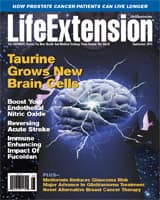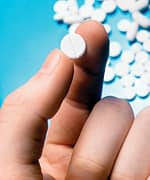|
|
|
Tuesday, September 8, 2015.
At Life Extension®, we believe that customers like you deserve more. That's why we've launched Your Healthy Rewards, an exciting new rewards program that earns you 2% LE Dollars back for virtually every purchase from Life Extension!*
Your Healthy Rewards is FREE.
No membership involved, no commitments required.
Your Healthy Rewards also gives you exclusive Life Extension benefits. You'll enjoy at least 25%-60% off pricing, have access to expert Health Advisors any day of the year, and receive a complimentary annual subscription of our hard-hitting, monthly Life Extension Magazine®.**
Double your LE Dollars with Your Healthy Rewards Premier
Earn 4% LE Dollars |
Earn 4% LE Dollars back on every product or blood test you buy from Life Extension.* LE Dollars NEVER expire once earned, and once earned can be applied to your next purchase!* |
FREE CHOICE Standard |
Enjoy FREE unlimited standard shipping to any address in the United States, a $19.95 USD value!† |
$50 USD LE Dollar Bonus |
Receive $50 USD LE Dollars at sign up, and each time you renew. |
Exclusive LE perks |
Enjoy at least 25%-60% off retail prices, complimentary access to expert Health Advisors, and FREE subscription to Life Extension Magazine®. |
Your Healthy Rewards Premier more than pays for itself!
*You earn LE Dollars on all your Life Extension purchases (except shipping fees, CHOICE and Premier program fees, Life Extension Magazine® subscriptions, or any purchases made with LE Dollars or gift card). Redeem LE Dollars for any purchase such as products, labs, sale items, and shipping fees at the rate of 1 LE Dollar being equal to $1 U.S. Dollar at checkout. LE Dollars may not be redeemed for Premier program fees, CHOICE program fees, Life Extension Magazine® subscriptions, or to purchase Gift Cards. LE Dollars have no cash value and are not redeemable for cash, transferable, or assignable for any reason.
**Your Healthy Rewards participants receive a free 1-year subscription to Life Extension Magazine with their first purchase of Life Extension supplements, blood tests, or blood test panels. Your Healthy Rewards Premier participants receive a free 1-year subscription to Life Extension Magazine when they enroll in Your Healthy Rewards Premier.
†CHOICE Standard pre-paid shipping offers unlimited shipping to any mailing address within the 50 U.S. states, excluding U.S. territories. CHOICE also gives you discounts on non-standard shipping, shipping outside of the United States, and expedited shipping costs. CHOICE pre-paid unlimited shipping excludes blood test products and gift cards. This offer is not available to international customers serviced by distributors of Life Extension products.
|
|
|
| |
|
|
What's Hot |
|
|
|
Diet alone may fail to provide optimal amount of vitamin E |
|
|
|
 |
|
| |
On August 19, 2015, the journal PLOS One published findings derived from National Health and Nutrition Examination Survey (NHANES) data that reveal a high prevalence of suboptimal alpha-tocopherol (vitamin E) levels among those for whom food alone was their only source of the vitamin.
Michael I. McBurney and associates analyzed information from 7,922 NHANES participants with available measurements of serum alpha-tocopherol. Food frequency questionnaires provided information concerning vitamin E intake from food or supplements.
Eighty-seven percent of subjects aged 20 to 30 years and 43% of those aged 51 years and older had vitamin E levels lower than 30 micromoles per liter (12.92 mg/L), which was categorized as inadequate based on Estimated Average Requirement (EAR) and the lowest mortality rate in the Alpha-Tocopherol Beta-Carotene (ATBC) study. Serum alpha-tocopherol levels among subjects whose only source of vitamin E was food were below adequate levels on average, at 24.9 micromoles per liter (10.72 mg/L). In comparison, those whose vitamin E was derived from both food and supplements had an average level of 33.7 micromoles per liter (14.51 mg/L). "We propose that for many Americans, especially those relying exclusively upon food sources, that serum alpha-tocopherol concentrations may not be adequate," Dr McBurney and colleagues write.
"The EAR, epidemiological and randomized controlled studies all indicate that maintaining a serum alpha-tocopherol concentration of 30 micromoles per liter may have beneficial effects on mortality, cognitive function and reproduction," they conclude. "This paper corroborates the need for research regarding to assessing serum alpha-tocopherol concentrations with respect to functional markers and health outcomes."
|
|
|
| |
|
|
Life Extension Clinical Research Update
Effects of Nutritional Supplements on Cognition, Mood, and Fatigue |
|
|
|
Life Extension is sponsoring a study to assess the effects of nutritional supplements in support of cognition, mood and fatigue in individuals with memory complaints, an altered mood and/or feelings of fatigue within the past six months.
If you or someone you know is:
- Between 40-70 years of age
- Normal weight to overweight (BMI 18.5–29.9)
- In good health
- Experiencing memory complaints, an altered mood, and/or feelings of fatigue (within the past six months)
- Currently drinking no more than one cup of coffee a day
- Able to comply with all study procedures and visits
Qualified participants will receive at no cost during the trial:
- Study product
- Blood tests
- Blood pressure evaluations
- Up to $250 for time and travel expenses
- A $50 referral bonus is also available.*
Please call 1-866-517-4536 for further information and to see if you qualify.
*If you refer someone who enrolls in a study and completes their final visit with closeout procedures, you will be compensated the amount noted for the study.
https://www.lifeextension.com/clinicalresearch/ClinicalTrials.htm |
|
|
|
|
Highlight |
|
|
|
Life Extension Magazine® September 2015 Issue Now Online

Grow new brain cells, by Forrest Ritiker
Reports
Enhance your endothelial function, by Alicia Nadil
The Japanese "longevity" dietary constituent, by Arthur Strand
Major advances in glioblastoma treatment, by William Faloon
An alternative to conventional breast cancer treatment, by Orn Adalsteinsson, PhD
Scientists create world's first functioning organ, by Merle Ostrovski
The 2015 International Stroke Conference, by Ben Best
A listing of comprehensive stroke centers in the United States
Departments
As We See It: Reversing acute ischemic stroke, by William Faloon
In the News
Wellness Profile: Sedell Rand, by Donna Caruso
Journal abstracts: Taurine, endothelial dysfunction, fucoidan, and thymus regeneration | |
|
|
|
|
|
|
Health Concern
Celiac disease and non-celiac gluten sensitivity |
|
|
Celiac disease is an inflammatory immune disorder that occurs in genetically susceptible individuals. In people with celiac disease, ingestion of gluten—the protein fraction of wheat, barley, and rye—provokes an immune attack that inflames and damages the lining of the small intestine. This typically results in nutrient malabsorption along with a wide variety of symptoms, ranging from diarrhea and constipation to skin rashes and depression (Brown 2012; Korponay-Szabo 2012; Lerner 2014; A.D.A.M. 2014). The reaction to gluten triggered by celiac disease is not an allergy, but rather an insidious inflammatory immune condition (FARE 2015a).
Untreated celiac disease can lead to the development of a host of other conditions including osteoporosis, infertility, neurological disorders, other autoimmune diseases, and in some cases, cancer (Ventura 1999; Fasano, Catassi 2012; Rashtak 2012; Kagnoff 2007; Sapone 2012; Bai 2013; UCMC 2014).
Some people who do not have celiac disease or a wheat or gluten allergy may still experience symptoms in response to gluten ingestion. These symptoms can resemble those associated with celiac disease and may include gastrointestinal symptoms and non-intestinal symptoms. This newly-recognized gluten-related syndrome has been named non-celiac wheat sensitivity or non-celiac gluten sensitivity. Current knowledge about non-celiac gluten sensitivity is limited, and many unresolved questions remain to be clarified (Volta 2013; Sapone 2012).
|
|
|
| |
|
|
Latest Products |
|
|
|

|
Aspirinworks™ Urine Test
Item #LC501620
|
|
Can an aspirin a day really prevent a heart attack?
Not if you're one of the 25% of people who are nonresponsive to aspirin's benefits!
This suboptimal response to aspirin is commonly known as "aspirin resistance." And, since these people are at increased risk of heart attack or stroke, doctors are beginning to recognize the importance of testing for aspirin's effect.
If you're taking aspirin to prevent a heart attack or stroke, you can't tell if it's working because you can't feel the effects it has on your platelets.
Aspirin works to prevent heart attacks and strokes by reducing the production of thromboxane, a chemical that makes platelets sticky. When aspirin works as it should, platelets make less thromboxane and are less likely to form a blood clot that could block your arteries. If blood is able to flow freely the risk of heart attack and stroke is reduced.
Although we can't measure thromboxane directly, we can easily measure 11-dehydrothromboxane B2, its chemical biomarker, in urine.
A low level of 11-dehydrothromboxane B2 in your urine means that aspirin is working to reduce thromboxane production. High levels of the biomarker may mean that your dosage of aspirin is not effective for decreasing your risk of a heart attack or stroke, and it's time for you and your doctor to consider increasing the dose or changing your treatment strategy.
The good news is that aspirin resistance is easy to identify with a simple urine test so your doctor can recommend alternative therapies if aspirin isn't working for you.
If you're not sure that the aspirin you're taking is working, it's time to order the Aspirinworks™ (LC501620) urine test now… on sale for $111.75. |
|
|

|
The Supplement Pyramid, by Michael A. Smith, MD
Item #33864 |
|
|
In The Supplement Pyramid, with a foreword written by health advocate, author and talk show host Suzanne Somers, Dr. Michael A. Smith covers the many reasons why even the healthiest diets fall short in terms of supplying the optimal amount of nutrients we need not just to survive, but also to thrive. However, with such a staggering amount of choices on the market, it's easy to become overwhelmed. That's where The Supplement Pyramid enters the picture. Like traditional food pyramids that help us design and follow a healthy diet, The Supplement Pyramid is an educational tool that can be personalized to meet anyone's specific nutritional needs. With its three-tiered plan—foundational, personalization, and optimization levels—The Supplement Pyramid helps readers design a nutritional regimen that meets their unique needs. Step-by-step instructions and detailed medical quizzes, along with useful information about blood testing, help readers determine the most important nutritional supplements for their bodies—and this becomes an ideal personalized menu from which to choose.
Michael A. Smith, M.D. is the senior health scientist and online personality for Life Extension, the world's leading organization dedicated to extending the healthy human life span. He is an author and blogger, creates and conducts webinars, and appears in informational health and wellness videos. |
|
|
|
|
|
Related Life Extension Magazine® Articles |
|
|
|
|
|
|







